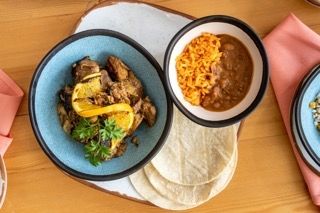Is Mexican Food Healthy? Unpacking the Nutritional Perks of Standard Active Ingredients
The concern of whether Mexican food is healthy and balanced welcomes an expedition of its conventional components. Beans and corn act as foundational staples, abundant in protein and fiber. Avocados give advantageous fats, while different natural herbs and spices include flavor and health benefits - hand crafted margarita. Together, these components develop a tapestry of nourishment. The healthfulness of Mexican cuisine usually depends on prep work approaches and portion dimensions. What function do these elements play in establishing its total dietary value?
The Power of Beans: Protein and Fiber-Rich Staples
Frequently overlooked, beans serve as a keystone of Mexican cuisine, using a riches of dietary benefits. Rich in healthy protein, they are an exceptional plant-based option for those seeking to fulfill their dietary healthy protein requires. This high healthy protein web content supports muscle mass fixing and development, making beans important for both vegetarians and meat-eaters alike. Furthermore, beans are an exceptional source of nutritional fiber, which helps in food digestion and advertises a sensation of fullness, possibly aiding with weight monitoring.
The range of beans used in Mexican dishes, such as black beans, pinto beans, and kidney beans, contributes to a diverse taste account and can improve meals nutritionally. Furthermore, beans are low in fat and have necessary minerals and vitamins, consisting of iron, folate, and magnesium. With each other, these features make beans a vital component, delivering both nourishment and nourishment in standard Mexican fare.

Corn: a Versatile Grain With Nutritional Benefits
Corn stands apart as a flexible grain fundamental to Mexican food, commemorated not just for its cooking applications however likewise for its outstanding dietary account. As a primary component in meals like tortillas, tamales, and pozole, corn offers vital nutrients that contribute to a balanced diet regimen. Rich in carbohydrates, it serves as a substantial power source, while additionally being low in fat, making it a desirable alternative for different nutritional demands.
Moreover, corn is an excellent source of nutritional fiber, which helps in food digestion and advertises satiety. It includes considerable amounts of vitamins such as B-complex vitamins, which are important for power metabolic process. The presence of antioxidants, especially carotenoids, adds to general health by reducing oxidative anxiety. Additionally, corn is gluten-free, dealing with those with gluten sensitivities. Generally, the dietary benefits of corn underscore its value in conventional Mexican food and its duty in a healthy and balanced diet plan.
Avocados: Healthy Fats and Nutrients in Every Bite
Avocados play a substantial duty in Mexican food, complementing dishes with their creamy structure and abundant taste. Past their cooking allure, avocados are commemorated for their remarkable dietary account. They are an abundant resource of healthy and balanced monounsaturated fats, which can aid lower bad cholesterol degrees and assistance heart health. In addition, avocados are packed with important minerals and vitamins, consisting of potassium, vitamin E, and B vitamins, adding to overall wellness.
The high fiber material in avocados help food digestion and promotes satiety, making them a valuable addition to any meal. Their special nutrient composition can likewise support skin health and wellness and supply anti-inflammatory benefits. Incorporating avocados into conventional Mexican meals or appreciating them as a standalone treat can enhance both flavor and nourishment, demonstrating why they are a beloved staple in Mexican food. Generally, avocados use a tasty way to enjoy healthy and balanced fats and critical nutrients in every bite.

Herbs and seasonings: Flavorful Health And Wellness Boosters
While taking pleasure in the rich tastes of Mexican food, one can not neglect the crucial role that spices and herbs play in boosting both taste and health. Components such as chili, oregano, and cilantro peppers not just contribute to the vibrant taste profile yet additionally provide significant health and wellness advantages. For circumstances, cilantro is known for its cleansing properties, helping to get rid of heavy steels from the body, while oregano is packed with anti-oxidants and has anti-inflammatory effects.
Chili peppers, a staple in many Mexican dishes, have capsaicin, which has actually been connected to improved metabolic process and discomfort relief. Additionally, spices like cumin and coriander assistance digestion and might help in blood sugar level law. Incorporating these savory health and wellness boosters right into dishes not just boosts the culinary experience yet additionally promotes general wellness, making Mexican cuisine not just tasty, but also nutritionally helpful.
Traditional Cooking Methods: Enhancing Nutrition and Flavor
Conventional cooking methods in Mexican food play an essential duty in improving both nutrition and taste, as they frequently focus on fresh ingredients and classic methods. Techniques such as nixtamalization, where corn is soaked and cooked in an alkaline service, not just boost the nutrient account of tortillas however also enhance their digestibility - New York Times rated. Additionally, using sluggish cooking approaches, like stewing or braising, allows tastes to combine beautifully while retaining the integrity of the ingredients

Regularly Asked Inquiries
Are Mexican Food Portions Generally Larger Than Various Other Cuisines?
Mexican food parts are frequently larger than those of several various other cuisines. This particular shows conventional dining techniques, stressing common sharing dakshin and hearty meals, which can result in a much more substantial serving size on the whole.
Exactly how Does the Preparation Technique Affect Healthiness of Mexican Food?
Preparation methods greatly influence the healthfulness of Mexican food. Methods such as grilling or steaming maintain nutrients, while frying can boost unhealthy fat material. Selections of components and cooking styles ultimately establish general dietary worth.
Can Mexican Food Be Customized for Certain Dietary Restrictions?
Mexican food can undoubtedly be tailored for certain dietary constraints. Alternatives, such as making use of corn tortillas for gluten-free diet plans or incorporating even more vegetables, make it possible for people to take pleasure in typical flavors while accommodating various nutritional needs.
What Prevail False Impressions About Mexican Food and Wellness?
Common mistaken beliefs regarding Mexican food include the belief that it is naturally undesirable, overly spicy, and solely concentrated on fats. In fact, typical recipes frequently include nourishing active ingredients and can be tailored to different nutritional demands.
Exist Healthier Choices at Mexican Restaurants?
Much healthier alternatives at Mexican dining establishments frequently include barbequed meats, beans, and fresh vegetables. Selecting recipes that emphasize whole active ingredients and preventing hefty sauces can lead to an extra healthy eating experience, promoting total well-being.
The range of beans utilized in Mexican meals, such as black beans, pinto beans, and kidney beans, adds to a diverse flavor profile and can enhance dishes nutritionally. Avocados play a significant role in Mexican cuisine, matching recipes with their creamy structure and rich flavor. Including avocados into standard Mexican meals or appreciating them as a standalone snack can boost both flavor and nutrition, demonstrating why they are a precious staple in Mexican food. While enjoying the rich tastes look at here now of Mexican cuisine, one can not neglect the essential duty that spices and herbs play in boosting both taste read this post here and health and wellness. Traditional food preparation methods in Mexican food play an essential duty in boosting both nutrition and flavor, as they frequently focus on fresh ingredients and time-honored strategies.